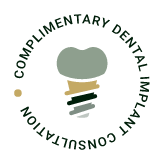Dental Implants — Spring Lake, NJ
Permanent Roots for New Teeth

No matter how many teeth you are missing, you need to find a replacement promptly to prevent the negative effects of tooth loss. For eligible candidates, there is no better replacement method than dental implants in Spring Lake. This option from one of the area’s leading implant dentists, Dr. Edward Dooley , provides a long-lasting solution for one, two, or many missing teeth. Dental implants from our Spring Lake, NJ dentist look, act, and feel just like your natural teeth! Keep reading to learn about dental implants at Dooley Dental, then request a free consultation with your trusted dentist -- for a superior tooth replacement.
Why Choose Dooley Dental for Dental Implants?
- State-of-the-Art Dental Technology
- Entire Procedure Completed In-House
- Implant Dentures Available
What Are Dental Implants?

A dental implant looks like a small screw and is made out of titanium or another biocompatible substance. It’s inserted directly into the jawbone where a missing tooth used to be. It then fuses with the bone and is treated like part of your body. When that happens, it can be used to support a crown, a bridge, or dentures. In other words, the implant serves as the “root” upon which your new tooth or teeth will rest. Because dental implants replace the entire tooth, dentists often recommend them if you’re looking for the closest thing to a natural tooth.
The Dental Implant Process

Anyone undergoing treatment with dental implants can expect a two-phase process. The first phase involves oral surgery completed by a trusted surgeon. During your surgery, a dental implant is placed in the socket of the missing tooth. A dental implant is a small, titanium screw that acts as an artificial tooth root. The total number of implants you receive depends on the number of teeth we’re replacing and the treatment plan that is best for you.
Once your implant has been placed, a healing period follows. During this time, the jawbone and gums fuse with the implant to create a strong, stable foundation for your new dental prosthetic. This process, which is known as osseointegration, contributes to the stable, realistic-looking results you can expect from dental implants.
After a period of three to six months, you’ll return to Dooley Dental for the second phase of your implant procedure which culminates in the attachment of your custom-made dental prosthetic.
Benefits of Dental Implants

No form of tooth replacement is perfect for everyone. We’ll help you explore the benefits of dental implants as well as other options before you have to make any decisions about how you want to repair your smile. That said, many dentists will recommend dental implants whenever they can because of how many advantages they have over other restorations. Below, you can learn more about some of the most outstanding benefits of dental implants and the impact they can have on your everyday life.
Day-to-Day Benefits

People who find that their dentures get in the way of their daily activities often upgrade to dental implants so that they can enjoy the following benefits:
- Eating Most Foods Without Any Trouble: Dental implants are far more stable than traditional bridges and dentures, and this comes with a variety of benefits. One of the most notable is that they have chewing power that’s almost equal to that of your natural teeth, letting them stand up to almost any food. As a result, you’ll be able to eat anything you want again.
- Boosting Your Confidence: Your new teeth will be carefully designed to blend in with the rest of your mouth and match your overall facial aesthetics. They’ll also be anchored firmly in place and won’t slip while you’re smiling, speaking, or laughing. You can therefore relax and show off your grin with ease.
- Speaking More Clearly: Dentures can sometimes get in the way of clear speech if they happen to slip at the wrong time. Dental implants keep your new teeth secure, thus allowing you to speak clearly at all times without fear of being interrupted by inopportune denture movement.
- Making Oral Hygiene Easier: Your oral hygiene routine won’t change much after receiving dental implants because you’ll be able to take care of your new teeth in much the same way you would your natural teeth.
Health Benefits

Dental implants don’t just make your everyday life better. They’re also good for your mouth and your body thanks to these benefits:
- Preserving the Jawbone: Did you know that your teeth are partially responsible for keeping your jawbone healthy and strong? Dental implants can fulfil this role once they’ve been inserted into the jaw, meaning they can actually help prevent bone loss unlike regular bridges and dentures.
- Protecting Your Natural Teeth: Dental implants act as a placeholder for the empty space left behind by your lost tooth. This stops your other teeth from shifting out of place and throwing off the alignment of your bite.
- Improving Nutrition: When dentures are limiting what you can and can’t eat, your overall nutrition will start to suffer. Dental implants have no real dietary limits and thus allow you to eat all of the different foods you need to keep your body healthy.
Long-Term Benefits

Dental implants have the potential to last a lifetime; with the right maintenance, they can stay in the mouth for decades without ever having to be replaced. The success rate of dental implants is around 95%, meaning you’re highly unlikely to experience failure or complications even after 10 years of use. The longevity of dental implants means you aren’t paying for new ones as often and can thus potentially save a lot of money as time goes by.
Who Dental Implants Can Help

Almost anyone can get dental implants. Even people who have suffered from bone loss may still be eligible after a bone graft. At our dental office, bone grafting can be performed at the time of any extractions that need to be performed to make room for the tooth. Once existing oral health issues have been taken care of, the implant surgery can be planned. The implant procedure differs quite a bit depending on the number of teeth missing. You have a number of options for your tooth replacement with dental implants. The one that is best for you depends on how many teeth you are missing and where in the mouth they are located. Dental implants can support anywhere from a single crown to a full denture in the upper or lower jaw.
Who Is a Good Candidate for Dental Implants?

Ninety-five percent of dental implant procedures are successful, but it is important that patients are healthy enough to undergo a surgical procedure before we can begin. Your implant dentist will consider your oral and overall health to determine whether or not you are eligible for dental implants. Patients who have diseases affecting the immune system -- like advanced-stage cancer or uncontrolled diabetes -- may not be able to heal properly. Severe cases of gum disease also affect a patient’s ability to undergo the procedure for dental implants.
The only way to know for sure whether you are a candidate for dental implants is to get in touch with your implant dentist at Dooley Dental.
Missing One Tooth

For just one missing tooth, a single crown can restore a dental implant placed anywhere in the jaw. The post can be placed straight into the jawbone without making changes to the surrounding teeth. This makes a single implant a more conservative alternative to a traditional dental bridge, allowing you to preserve your natural smile.
Missing Multiple Teeth

There are different ways to replace multiple teeth at once with implants. Were all the lost teeth in a row? Replace multiple missing teeth with the prosthetic teeth (the bridge) cemented directly over the dental implants.
You can also get a bridge supported by two dental implants. Were they in different parts of the mouth? Look into getting an implant-retained partial.
Missing All Teeth

Is an entire row of teeth gone? A denture supported by 4 to 6 implants could be your best bet. A full or partial set of dentures can be removed for cleaning and before you sleep at night. Snap on dentures support the prosthetic with two to four dental implants; bar-retained overdentures support your prosthetic with a bar over the dental implants.
All-on-4/Teeth in a Day

Dentures that cannot be removed for cleaning. All-on-4 dentures (also known as Teeth in a Day) can secure a loose existing denture and may be completed in just one day.
Understanding the Cost of Dental Implants
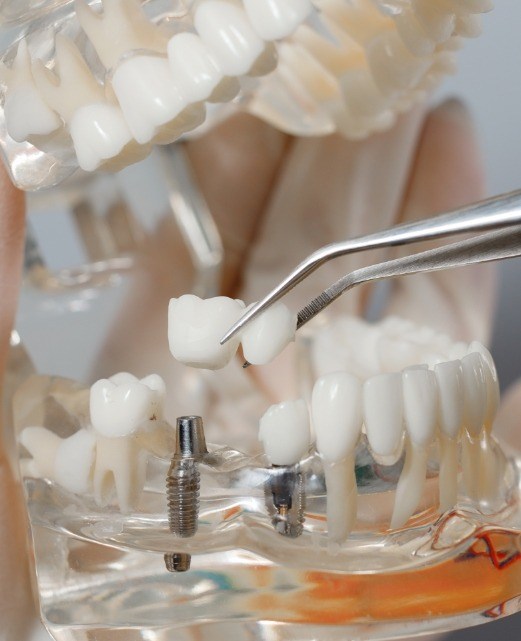
When looking up prices for dental implants online, you’ll likely find that the numbers vary significantly. The simple truth is that the price of dental implants is not set in stone; depending on your situation and your needs, the cost of your dental implants can change significantly. Dr. Dooley and the rest of our team will outline the financial aspect of the dental implant process for you so that you aren’t caught off guard later down the road.
Types of Dental Implants
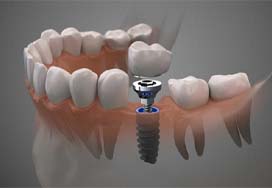
It goes without saying that “replacing missing teeth” will mean different things to different patients. It could mean replacing a single front tooth, two or three posterior teeth, or even an entire arch. Depending on your needs, you might only need one implant topped by an abutment and a dental crown, or you could get four to six implants to retain full dentures. That’s not even taking into account the different materials that can be used; most implants are made of titanium, but they can also be made of zirconia. All of these factors will affect the final price.
Stages of the Dental Implant Procedure
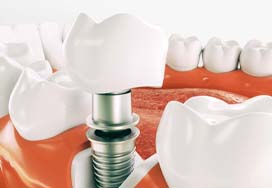
Some patients can’t get implants right away. They might need to get bone grafts so that the jaw will properly support and integrate with the metal posts, or they might need periodontal therapy to get rid of any existing gum disease. Such procedures will naturally come with their own costs.
Once the preparations have been made, the implant posts will be inserted into your jaw. Once you’ve recovered, you may or may not need to get an abutment depending on the type of restoration you get. You might also have a temporary restoration before you can receive your permanent one.
Dental Implants: Worth the Investment
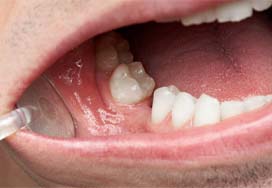
Despite being more costly than other forms of tooth replacement, dental implants are definitely worth it. The posts are secure in the jaw, meaning there’s no slipping to worry about. You can eat whatever you want and speak with confidence. Furthermore, while dentures and dental bridges may only last about 10 years, dental implants have a lifespan that can easily reach 30 years; because of this, the long-term cost of implants may actually be less than what you would end up paying for a different type of restoration! Additionally, the prevention of bone loss in your jaw could potentially save you from dealing with certain dental health problems in the future.
Does My Dental Insurance Cover Dental Implants?

There are many different dental insurance plans, and coverage varies from company to company. In general, dental implants won’t be fully covered, but you might get partial benefits for the initial consultation or related procedures like periodontal therapy. We’ll go over your insurance plan with you and help you maximize your benefits to help make your treatment as affordable as possible. We can help file the necessary claims and forms on your behalf.
Dental Implant FAQs

Dental implants are an excellent tooth replacement option with amazing benefits that you can’t find anywhere else. However, you may still have some unanswered questions. Here are the answers to some of the most common inquiries we receive about dental implants in Spring Lake. If you don’t see the information that you’re looking for below, don’t worry! Just give us a call, and we’d be happy to answer your questions and schedule you for an initial consultation.
How Long Do Dental Implants Last?
The lifespan of dental implants depends on the patient’s health and lifestyle choices. To ensure that implants last, it’s important to brush, floss, and rinse with mouthwash on a daily basis. Attending dental cleanings and checkups is also crucial to maintaining the health of your dental implants. When cared for properly, implants can last upwards of 30 years. This is several times longer than traditional bridges and dentures.
Does Getting Dental Implants Hurt?
Your mouth will be numbed with a local anesthetic before the procedure begins. You will also most likely be sedated, lowering your body’s ability to register pain. While the surgery shouldn’t be painful, your mouth may be sore for a few days afterwards. Any discomfort can be managed by taking over-the-counter and prescription medication as directed. Cold compresses are also effective at managing pain. If your discomfort worsens, rather than improves after three days, give us a call!
How Long Does It Take to Recover from Dental Implant Surgery?
It can take up to six months for your implants to completely fuse with your jawbone, but you should be able to resume your normal activities the day after surgery. Avoid strenuous exercise for the first week or so, as this can delay the healing process. Bleeding should stop after the first couple of days, and swelling should subside after three to four days. Take all prescribed and over-the-counter pain relievers as directed.
Can I Get Dental Implants If I’m Diabetic?
If your diabetes is under control, your odds of dental implant success are comparable to those of nondiabetic patients. Uncontrolled diabetes and chronic high blood sugar can slow down the healing process and make it more difficult for your implants to integrate with your jawbone. If you’re looking to replace your missing teeth with dental implants, talk to your endocrinologist or primary care physician about getting your blood sugar levels under control beforehand.
Do Dental Implants Feel Natural?
Once dental implants are placed in the jawbone and completely heal, they will feel just like natural teeth would. The implants themselves don’t have any nerve endings, so all sensations you feel in the area will come from the gum tissue surrounding the implant.
Maintaining & Caring for Your Dental Implants

Dental implants can last for a lifetime with proper maintenance. While not too common, dental implant failure can occur even after initial success due to a condition known as peri-implantitis. It is caused by the buildup of plaque and bacteria around the dental implants. Not only can peri-implantitis be largely avoided with proper dental hygiene, but you can prevent most cases of failure by keeping just a few day-to-day habits in mind. These can be found in more detail below or you can ask us questions during your next visit.
Make Oral Hygiene a Priority

At minimum, you should be brushing at least twice a day and flossing daily. If you have a removable denture attached to your dental implant, make sure you clean it properly every day. Clean around your implant abutments as directed to prevent the buildup of harmful biofilm. For fixed prosthetics, brush and floss regularly, and use an interdental cleaner or water flosser for thorough plaque removal. It may also help to introduce an oral rinse to your routine as well, just make sure that it’s alcohol-free.
Eat a Healthy Diet

Your oral hygiene isn’t the only thing that can influence your risk for dental disease. Do your best to reduce consumption of foods high in sugar as these contribute greatly to plaque production. Instead, look for healthier options in your meals, including fruits and vegetables. Regularly eat foods high in calcium, potassium and vitamin A, C, and D. Your dental implant is able to break down just about anything you throw at it, but you’ll still need to ensure your diet is balanced in the long-term.
Break Bad Habits

Dental implants are incredibly strong and long-lasting, but they are still susceptible to damage when performing bad habits that affect teeth. For example, biting your fingernails, chewing on ice cubes, using your teeth as a tool, and chewing on inedible objects like pens or pencils carry the potential to damage your dental implants just as much as your natural teeth. Make sure to have the right tools nearby for performing certain tasks and find ways to break bad habits involving your teeth.
Protect Your Dental Implants

If you play a lot of contact sports or have a teeth grinding habit, it’s vital that you have the right protection for your dental implants. Playing sports like football, basketball, or hockey carry an inherent risk for sudden impact, putting you at higher risk of damaging your tooth replacement. The same logic applies if you grind and clench your teeth while you sleep, which can be easily mitigated with a custom nightguard.
Schedule Regular Dental Checkups

Your implant’s restoration cannot develop decay, but you’ll still need to visit a dentist every six months for a routine exam and cleaning. Dr. Dooley can not only confirm that your at-home oral hygiene is effective at preventing plaque buildup, but remove any plaque or tartar that could have been missed. He’ll also examine your dental implant and its restoration to make sure no issues are present.

